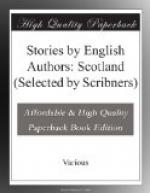Almost every second or third day Janet trod that long lochside road to New Dalry for her proof-sheets, and returned them on the morrow corrected in her own way. Sometimes she got a lift from some farmer or carter, for she had worn herself with anxiety to the shadow of what she had once been, and her dry bleached hair became gray and grayer with the fervour of her devotion to letters.
By April the book was published, and at the end of this month, laid aside by sickness of the vague kind called locally “a decline,” she took to her bed, rising only to lay a few sticks upon the fire from her store gathered in the autumn, or to brew herself a cup of tea. She waited for the tokens of her book’s conquests in the great world of thought and men. She had waited so long for her recognition, and now it was coming. She felt that it would not be long before she was recognised as one of the singers of the world. Indeed, had she but known it, her recognition was already on its way.
In a great city of the north a clever young reporter was cutting open the leaves of “The Heather Lintie” with a hand almost feverishly eager.
“This is a perfect treasure. This is a find indeed. Here is my chance ready to my hand.”
His paper was making a specialty of “exposures.” If there was anything weak and erring, anything particularly helpless and foolish which could make no stand for itself, the “Night Hawk” was on the pounce. Hitherto the junior reporter had never had a “two-column chance.” He had read—it was not much that he had read—Macaulay’s too famous article on “Satan” Montgomery, and, not knowing that Macaulay lived to regret the spirit of that assault, he felt that if he could bring down the “Night Hawk” on “The Heather Lintie,” his fortune was made. So he sat down and he wrote, not knowing and not regarding a lonely woman’s heart, to whom his word would be as the word of a God, in the lonely cottage lying in the lee of the Long Wood of Barbrax.




